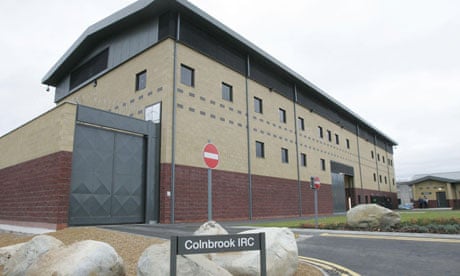Home Office deportation flights are being prevented from taking failed asylum seekers directly to northern Iraq because of a diplomatic dispute with the Kurdish regional government (KRG).
A ban has in effect been placed on incoming flights from the UK landing forcibly returned Kurds at the regional airport in Irbil. Political objections and local protests have led to the UK Border Agency redirecting the planes to Baghdad.
Another round-up of failed Iraqi asylum seekers has been ordered in the past week. At least 60 people are now being held at Colnbrook detention centre, near Heathrow, awaiting removal by charter flight. Those about to be deported have been given tickets dated 1 or 6 September.
Thousands of Iraqi refugees remain in Britain, many having arrived before the 2003 invasion when Saddam Hussein was persecuting the Kurds.
The Home Office's forced repatriation of asylum seekers denied permission to remain in Britain has been diplomatically fraught. The first flight to Baghdad last year led to airport officials in the Iraqi capital refusing to accept all but a handful of passengers. Most were denied entry and sent back to the UK.
To assuage political sensitivities, Iraqi interior ministry officials are permitted the unusual privilege of interviewing and screening detained asylum seekers in UK detention centres to confirm they will accept each individual.
The UK policy of sending deportees back to, or through, the central provinces of Iraq, which include Baghdad, is in defiance of guidelines issued by the United Nations high commissioner for refugees, which warns that the area remains unsafe due to suicide bombs and attacks by al-Qaida militants.
One Iraqi deported from the UK was killed by a car bomb in Kirkuk in 2007. The continuing violence claimed more than 60 lives following a series of co-ordinated blasts in Iraqi cities during just one day – 25 August – last week.
The KRG, the semi-autonomous administration that runs the Kurdistan region of north-east Iraq, controls its own militia. For many years, it has objected to forcible returns of failed asylum seekers from western European countries, threatening to withdraw diplomatic co-operation.
Many deportation flights from the UK have nonetheless been sent to Iribil; on the first flights deportees were ordered to wear flak jackets for their return to what was deemed a safe country.
An official at the KRG representative office in London said: "The KRG has asked the British government to send only those people who want to go back. It is opposed to forcible deportations."
The last UK deportation flight to Kurdistan was about five months ago. The Home Office now accepts that it will have to send Kurdish Iraqis back via Baghdad unless the KRG agrees to reopen direct flights.
The border agency told the Guardian: "UKBA only ever returns those who both the agency and the courts are satisfied do not need our protection and refuse to leave voluntarily.
"Currently we have agreement with the government of Iraq to return all Iraqi citizens to Baghdad. We make arrangements for those who require onward travel to their home towns, and this includes those travelling to the KR [Kurdish region].
"These arrangements worked well on the recent charter flights to Baghdad and we are confident they will continue to do so."
Political opposition to forcible deportations has been led by the International Federation of Iraqi Refugees, which has organised protests both in western European countries and within Kurdistan.
More than 2 million Iraqis fled the sectarian violence which erupted after the 2003 invasion. Most sought sanctuary in neighbouring Arab states but many were attracted by the opportunities of employment in the EU.
Richard Whittel, of the Coalition to Stop Deportations to Iraq, said: "It is inspiring that popular pressure in Kurdistan forced the government there to take a stand against these deportations but disturbing that our government persists with them, pandering to the myth that immigration is to blame for the country's problems."
Among the common complaints raised by opponents of forced removals have been persistent allegations that failed asylum seekers are mistreated by security guards when they are forced on to planes in Britain for flights back to Iraq.
